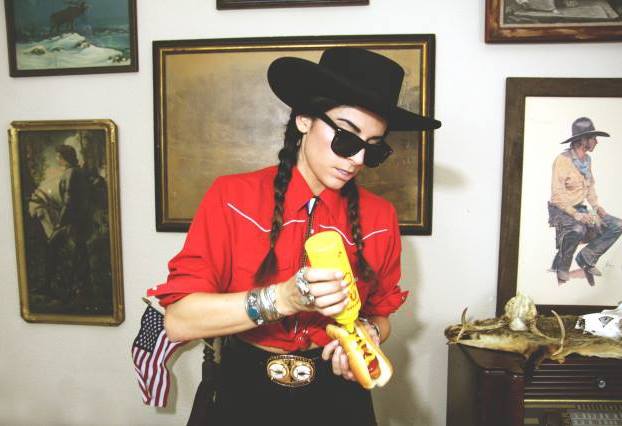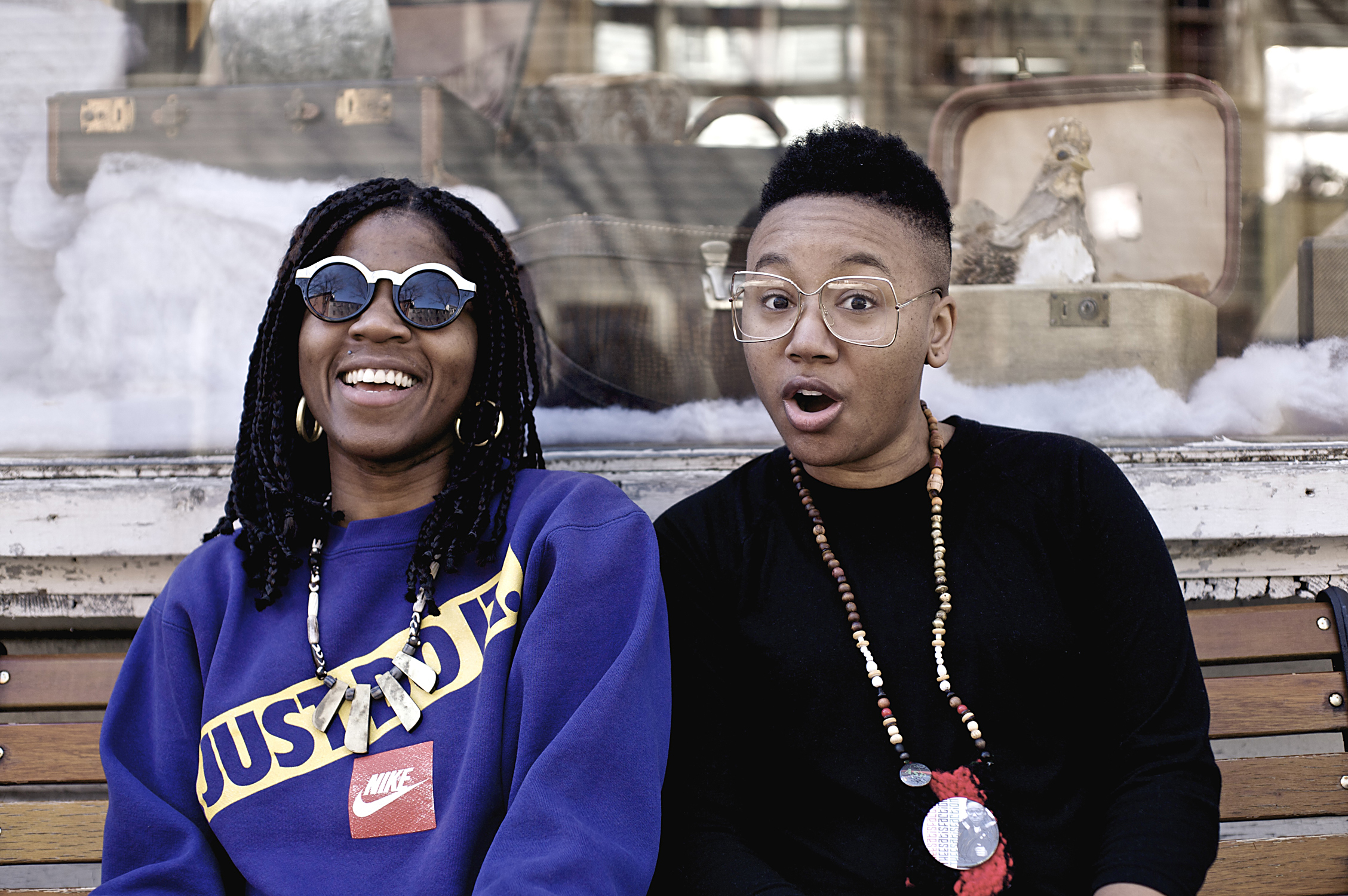Kevin Barnes, front man for Athens, Georgia art-rock band of Montreal, has long suffered from depression. Exploring notions of identity and sexuality through various personas in song (notably Georgie Fruit, his funky, black, she-male creation) and as costumed characters on stage, his 11-album canon of vivid, psychedelic indie-pop echoes his mind state with a feel of schizophrenic pageantry. His psychic wanderings and dark days have famously fueled his output, inspiring 2007’s excellent Hissing Fauna, Are You The Destroyer? as well as the band’s latest release Paralytic Stalks, just rated a 4.6 by Pitchfork. Here Barnes talks about his moods, his lyrics, his relationship with the music press, and has a question about our state’s iconic fishery. of Montreal plays the Showbox at the Market this Saturday (3/24) with Deerhoof and Kishi Bashi.You just played the first date on your Paralytic Stalks tour. How was the concert? It was great, it was interesting because it was the first show we attempted the video production. I was playing a lot more piano and sitting down a lot, I’m a bigger part of the ensemble now, and it definitely feels strange and different.What’s the view like from the piano, as part of the ensemble? It’s weird sort of. At the piano, you have to be way more controlled. It’s not something I can do the same way I play guitar and run on stage, drunk. In this way I have to be more composed and together. There’s definitely a sense that I’m part of the organism. For me, the new material is coming from a different place, it’s an odd feeling to jump from the new material to the older material. In my head I’m like, ‘whoa this feels weird, so different.’ It’s something I’ve got to wrap my head around.It feels different performing the material live? Yeah, somehow the character, or the muscle memory, and all the experiences I’ve had playing Skeletal Lamping songs and False Priest songs, it felt so natural when I was doing it back then, but now when I do it, initially, it really feels kind of jarring, to go from the Paralytic Stalks songs to any of the older material. I definitely notice it as I’m singing, I’m like, ‘this is weird now.’ I don’t know what it is, I guess I got in a groove of some sort, and it all made sense, and now I’m in a different place. It’s not as easy just to jump right back in.I would think that’s something you’d be used to by now, from all the different ways you’ve approached your albums. Yeah, but maybe they’re all part of some spirit and I’m in this new place now. It’s definitely a feeling I can’t deny, but that was just the first show, maybe it’ll get easier as it goes on, it usually does. I think the new album is this highly emotional, highly personal statement, coming from a very dark place of pain, frustration, and depression. It sounds that way to me. But I’m realizing if you’re not me, you might not pick up on all that. It is fairly colorful sounding, so I always have to remind myself that I’m not the only one who matters and other people are going to listen to it and form their own opinions and have their own perception of it. In that way, I also think that it’s part of the therapeutic process. The good part is writing about it, exploring, examining it, and trying to work your way through it, and then the other part, to me, is performing the songs live, and realizing that these are universal themes that can transform from your little insular world into something more universal and more communal. How are you feeling these days? Every day is better, but you never know. That’s the kind of ultra weird thing. I might wake up one day and think, ‘You shouldn’t face the day with anxiety, you should face the day with enthusiasm.’ Every day I don’t know if I’ll wake up feeling a certain way that might change in 20 minutes, or the next day, or stick with me the whole time. But I’m not, like, suicidal all the time.What’s it like when you hear mixed reviews of your albums? Does that effect your perspective? I try not to absorb that so much. So many people have so many different agendas. I might think, ‘such and such website gave me a bad review, and that means I’m not a good artist, or I failed at my attempt at making art,’ but then when you really think about it, it’s like, well, that’s just one joker who’s probably not very sophisticated musically. You can get caught up on it, and I have many times, especially if it’s extremely hurtful or feels like a personal attack, because I’m so deeply connected to the album, but I have to remember it’s just a part of the game. And really, this is nothing new. This is the relationship artists have had with critics for centuries. Me being upset with some random critique of my art is something I’ll always have to deal with, such is the relationship. I don’t have that much respect for critics in general.A lot of artists do engage with their reviews. To some degree, I kind of always feel hurt by them, so it’s like this strange self-abuse. It’s never like, ‘oh, this record is fantastic, it saved my life, thank you Kevin Barnes, you’re a genius.’ I think the problem most critics have is a superior attitude. Like they’re looking down on it, like, ‘how cute, he’s trying to do this thing.’ But they could never do it in a million years. It’s so idiotic that they would feel so confident to just lay it out like that, and they don’t even understand the intricate subtleties and the nuances of the thing. Half the time they criticize something that’s not even true, like oh, ‘he says this in this one verse,’ when actually I didn’t say that at all.You made a comment about that on your Facebook page, about a word in “Malefic Dowery.” Someone thought you said “crotch” but the lyric is actually “crutch.” Are you often asked to explain your lyrics? Yeah, that’s a review where the guy was like, ‘there are three things I don’t like about this record, one of them is that he says crotch instead of crutch.’ To me, I guess I was like, ‘aw, I should have enunciated better.’ That’s kind of ridiculous. Like Paralytic Stalks, you’ve released a number of albums on cassette. Is that format popular with your fans? It definitely feels like a novelty item. Even more so than vinyl. It’s pretty easy to go to the Salvation Army and find a tape deck for $3. You know, it’s definitely not a common thing, it’s kind of just for people who are interested in collecting. It has an appeal in that way.The one thing I find common among fans of the cassette is that they all had a boombox growing up. Yeah, definitely. I recorded some of my first albums on cassette 4-track. I have like hundreds and hundreds of cassettes slowly deteriorating into some kind of weird mush. [laughs] Tapes are great. I remember the first wave of tapes, when you could actually make mixes for people. It’s definitely a cool format, I definitely had a relationship with them but I haven’t really thought about them in a long time. Bands like Guided by Voices and Sebadoh put out records by 4-track. I think it’d be a good thing if they came back, I like that sound.Any final thoughts for us out here in Seattle? Do you still trust the salmon industry?
More Stories From This Author
Capitol Hill Block Party Artist Panel Series 2019
The Capitol Hill Block Party Artist Panel Series 2019 is free (no festival wristband required), all-ages, and takes place from…
By
Seattle Weekly • July 9, 2019 11:10 am
Golden Idols will release new EP
Seattle quartet returns with ‘Uneasy’
By
Seattle Weekly • June 24, 2019 5:30 pm
Travis Thompson, Wolf Parade headline Fisherman’s Village fest
The Everett Music Initiative festival, May 16-18 in Everett, will showcase more than 50 acts.
By
Evan Thompson • March 18, 2019 12:00 pm







